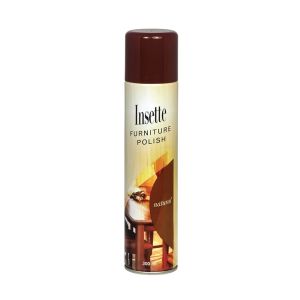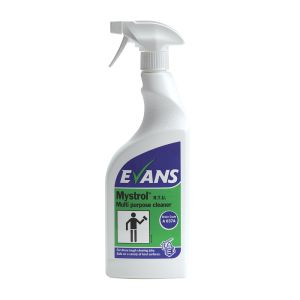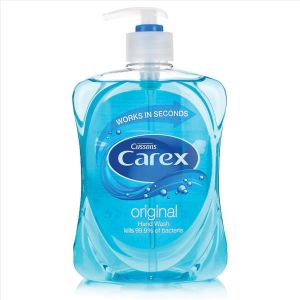Best Practice: Infection Control - Office Hygiene
When thinking about bacteria and bad hygiene, where does your mind go? A toilet seat? Mushy old fruit in a fruit bowl? Those dirty socks under your bed? But, what about the office or workspace you spend eight hours a day in?
If you’re sitting at your desk, take a look around. See the papers and notebooks scattered about, some snacks to the side of you and a big coffee ring stain right in the middle. If this is your view, brace yourself for what we are about to tell you.
According to The Cleaning Services Group , an office desk can be 400 times dirtier than the average toilet seat. An office telephone has 25,127 microbes (bacteria that can cause illness) per square inch. The average keyboard holds 3,295 microbes and a computer mouse has around 1676 microbes per square inch. Whereas, a toilet only has 49 microbes.
So, have you ever stopped to think how clean your workplace really is? If not, maybe now is the time to start.
The Cleaning Service Group also reported that eight out of ten people in the UK, work in an office. They spend an average of eight hours a day, five days a week in their workplace. Now, due to the amount of time spent there, you’d think the environment would be more hygienic, but this isn’t necessarily the case.
Perhaps because it isn’t our home, we naturally care that little bit less, or maybe, we feel it isn’t our responsibility to keep our offices clean. But in reality, when it comes down to it, office hygiene is in our hands, which makes it the responsibility of us all.
Microbes are a type of bacteria you often cannot see with the naked eye and even the neatest of desks can have masses of germs building up on them. With many people forgetting to regularly sanitise their desk surfaces, a thorough cleaning routine could help you to reduce the number of bacteria that’s present.
You should ideally wipe your desk down on a daily basis with multi-purpose wipes or a spray cleaner and damp cloth. The typical multipurpose cleaner is versatile and efficient when it comes to ensuring the surface areas you use are more hygienic.
As noted, the average keyboard harbours 3,295 microbes and so because it is such a vital piece of office kit for any worker, it should also be cleaned on a daily basis. The gaps between keys can collect lots of dirt, such as dead skin cells or food that will encourage bacteria to grow. So, if you are one of those two out three office workers that eats at your
desk, you should probably stop.
Beyond the common cold there are many other bacteria that we can come into contact with. This is why it’s good to discourage people from eating at their desk, as it poses a serious risk to food becoming contaminated. Remember to also keep kitchen areas neat and every month clean out your work fridge.
Three in five infections are caused by dirty hands and so all offices should enforce a hand washing guide that explains in detail the proper hand hygiene procedures. It has been said that only 40% of people wash their hands after using the toilet; increasing the spread of bacteria and illness at a fast pace.
Antibacterial hand wash should be present in all bathrooms and kitchens. This will encourage staff to wash their hands before and after eating or using the toilet. For washing instructions, refer to our step-by-step hand-wash guide.
Germs are most commonly spread from toilets being flushed without the lid closed. Within 60 seconds of someone flushing a toilet, an average sized restroom can be covered with bacteria, urine and faecal matters. Toilet seats should therefore be sanitised regularly, toilet flush handles should be cleaned several times a day and toilet rolls should be held in
protected holders.
E.coli can make its way onto keyboards and door handles if hands are not properly washed after using the toilet. Enterococcus faecalis bacteria can also be transferred, which can survive for as long as 24 hours, causing urinary tract infections.
According the latest available figures, a report from the Office for National Statistics notes that an estimated 137 million working days were lost because of sickness in the UK, in 2016. This is an equivalent to 4.3 days per worker. Minor illness such as a cold or cough accounted for most of these days. It also found that employees have a much higher rate of
sickness absences compared to those who are self employed - 2016 shows 2.1% for employees and 1.4% for self employed.
Other findings discovered:
- Smokers had a higher asbence rate of 2.5% to those who had never smoked at 1.6%.
- The sickness rate was higher in the public sector at 2.9% compared to those working in private firms which was 1.7%.
With good hygiene, perhaps these figures can be reduced. If you manage a team in your workplace this is something to consider for the future.
Office cleaning guide
What you should be doing and what to avoid at work to maintain good office hygiene:
With an illness such as the common cold, it usually takes people around seven to ten days to recover and is the main reason that people miss work each year. There is a lot to take into account when it comes to maintaining high standards of hygiene at the office to reduce the likelihood of illness being spread around colleagues.
To help we have summarised some of the key points in this chart below.
What to Do
- Wash your hands on a regular basis throughout the day.
- Disinfect and clean your desk including keyboard, mouse and phone.
- Carry antibacterial gel around with you and use it often.
- Wash hands after eating and using the toilet.
- Stay at home if you are ill - employees who have an illness should stay away from the office for at least 48 hours after the symptoms have occured to avoid spreading it to others.
- Avoid close contact with others such as hugging, kissing or shaking hands.
- Have your own cleaning products if there are none available to you.
- Smoke, eat and drink in designated areas only.
- If you have a kitchen area at work be sure to wash any cups and dishes after use with washing up liquid.
What to Avoid
- Avoid coming into work when ill.
- Don't eat at your desk.
- Avoid using other peoples phone.
- Coughing or sneezing without covering your mouth.
- Avoid other colleagues who are ill and still at work.
- Avoid touching your eyes, nose and moth with unwashed hands.
- Using old cleaning cleaning cloths to keep desks clean.
- Spreading germs onto items that will be put near your mouth, such as phones.
You should try to encourage employees to do their part to maintain the office. A friendly reminder of office policy can sometimes be all that is needed to increase the likelihood of employees keeping a tidy workspace. Instigating a weekly clear desk policy can prove to be effective. You should make antibacterial wipes and general desk cleaning products available for everyone to use at anytime.
Here is the full list of the microbes that can be found on your office equipment and the length of time they can survive:
1. MRSA - 200 days
Protecting yourself and others:
Cleaning, sanitising and disinfecting areas are the three most important methods to help prevent this superbug. Disinfectants can kill and destroy this type of bacteria. Bleach is also know to do so but it must be diluted and used correctly. Sanitising will also reduce the number of bacteria but without the disinfectants it won’t kill it.
You should definitely not go into work if you come down with this bug and should immediately consult a doctor and inform your office manager.
2. Common cold - 50 hours
Protecting yourself and others:
Good personal hygiene is simply the best way of preventing a cold. Encouraging others to cover their mouth and nose when sneezing, using tissues and washing your hands with warm water and soap several times throughout the day can cut down the chances of getting a cold.
Limit the sharing of tools within your offices such as computer mouses, phones, pens and notepads. Keep on top of disinfecting your desks and door handles across the office too.
3. Influenza - 60 hours
Protecting yourself and others:
Specific hygiene methods must be put into place when it comes to preventing an illness such as influenza. The flu virus is easily killed with common cleaning products and disinfectant, when used on surfaces and equipment around the office. You should clean once a day using damp rather than dry cloths.
Clean your hands frequently with soap and water and dispose of any used tissues. Rubbish bags should be tied up and thrown away into the main bin, not left lying around the office or under desks.
You should avoid going to work if you have Influenza to prevent the risk of passing it on.
4. Hepatitis A&B - 160 hours
Protecting yourself and others:
There are many ways you can get rid of the hepatitis infection by taking responsible and practical measures. You should ensure that the office is designed to minimise exposure to blood and other bodily fluids - this can be done by covering all cuts and breaks to the skin with waterproof dressings.
Good housekeeping and overall good hygiene will play a huge role in preventing this type of infection. Appropriate waste management should also be taken care of.
5. Norovirus - 350 hours
Protecting yourself and others:
Wash your hands carefully with soap and water, especially after using the toilet, as well as before or after eating. If soap and water is not available use hand sanitiser. Clean and disinfect surfaces and make sure you wash your clothing thoroughly if you or anyone around you has been ill.
6. C.Difficile - 110 days
Protecting yourself and others:
This bacteria can be spread very easily and it may not be possible to completely stop it from spreading all together but there are a number of precautions that can be taken reduce the risk of infection.
It is advised that you wash your hands with soap and water, keep all bathroom, work and kitchen surfaces cleaned and disinfected on a regular basis. Always put the seat down after using the toilet if you have had diarrhoea.
7. E.coli - 500 days
Protecting yourself and others:
E.coli is the cause of around 85-90% of bladder infections and has adapted itself to survive within the human body.
E.coli must be prevented mainly in the kitchen. You should keep yourself and the kitchen clean by washing your hands and drying them thoroughly, before preparing your food - especially if you are dealing with raw meat or vegetables.
Dishcloths and tea towels should be changed regularly, as germs will breed on them both. Make sure all food is kept at the right temperature and prevent spillages in fridges - clean these regularly if they are dirty and avoid cross-contamination.
Tips to keep your office clean
In order to keep your office clean and tidy you should customise a daily, weekly and monthly office cleaning list. This of course doesn’t have to be done by you but, if you do hire a cleaner it’s good to let them know what it is you require.
Cluttered and unorganised workspaces will have a negative effect on a person’s mood at work, as well as making the office look unprofessional, which could be damaging to a company.
If your office has occasional visitors or clients, it may give off an impression that you can’t organise your work well. Cleanliness and tidiness will create a respectable image to encourage clients to want to do business with you.
Before you make your office cleaning list you will need supplies such as:
- Multi Surface cleaners
- Furniture polish
- Disinfectants and sanitisers
- Bins and bags
- Soaps - hand wipes, creams and hand sanitisers
- Air freshener
- Carpet cleaner
- Floor care
- Toilet cleaners
- Window and glass cleaner
- Washroom cleaner
- Bleach
- Kitchen sprays
- Drain cleaners
- Dishwasher products
Daily cleaning list:
Your daily cleaning list should be made up of smaller tasks to complete, in order to keep the office to a standard suitable for people to work in. It should address the communal areas of the office including the reception, workspaces, toilets and kitchen area.
Daily cleaning should include:
- Vacuuming - Vacuum all floor space and staircases.
- Mopping - Office floors should be mopped daily due to accidental spills, mud and dirt from peoples’ shoes. Use multi purpose / all purpose cleaners on hard and tiled floor areas.
- Emptying bins - Office bins need to be emptied of food waste and other rubbish. Emptying them daily is the best way to keep a hygienic environment.
- Surface area and equipment wipe down - All desks, keyboards, mice and phones should be cleaned using surface disinfectant wipes or by applying disinfectant spray onto a cloth. This should be done every other day to get rid of everyday germs and prevent them from spreading.
Weekly cleaning list:
Your weekly cleaning list will require deep cleaning of items to create a much healthier work environment for all.
Weekly cleaning should include:
- Polishing - All surfaces should be polished including floors and tables. This is the best way to eliminate dirt.
- Glass windows cleaned inside and out - Cleaning windows inside and out will provide visible cleanliness instantly for visitors and staff in the office.
- Check fridges - Fridges need to be checked for out of date food and spillages. Anything that is out of date should be thrown away and the fridges should be wiped down to prevent illness caused by bacteria.
Monthly cleaning list:
A monthly cleaning list will be shorter than daily cleaning lists. It should be limited to items that can be neglected, whilst remaining within important health and safety guidelines.
Monthly cleaning should include:
- Clean fabric chairs - Fabric chairs should be washed down and cleaned with a microfibre cloth, fabric cleaner or soap and warm water. If you have a steam cleaner to hand then use that for best results. Both treatments will leave you feeling like you have a new chair.
- Dust all surfaces including harder to reach areas and skirting boards - Monthly dusting requires a little more effort. You need to include those hard to reach areas, skirting boards and all corners of the office. Those hard to reach places that you don’t often look at can collect so much dust and dirt.
- Vacuum and deep clean all surfaces - This is different from your weekly cleaning with a little bit more elbow grease required, pulling out furniture and vacuuming those hard to reach places. For tough stains on carpets such as chewing gum, there are specific approaches to remove it off the floor. You can either freeze it or dissolve it but here is a step by step breakdown:
- Place a few handfuls of ice in a zipped up bag
- The bag of ice need to go directly onto the gum stain. This will harden it so it’s easier to remove from the carpet.
- Use a scraping tool (a blunt knife will do), to scrape the gum from the carpet.
- Sponge the gum stain directly with cleaning fluid such as Enhance Spot & Stain remover.
- Cover the gum stain with a clean white towel or rag to soak up any remaining liquid and continue patting dry.
Using all of these office cleaning tips will help to maintain a much happier and healthier workplace for both workers and clients as they will be working in cleaner environment. Cleanliness is the responsibility of everybody in the workplace and employees that show they care by keeping areas clean are demonstrating professionalism and respect.
Download and print our Office Cleaning Checklist for a helpful reminder to keep in your office.





